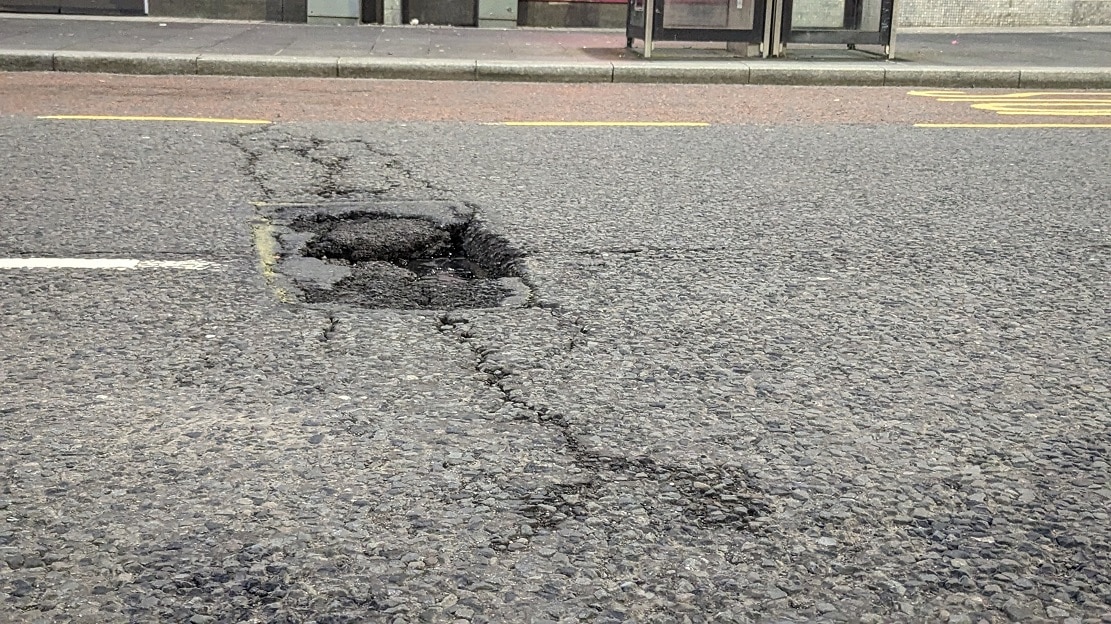
The Infrastructure Minister has been asked to respond following a critical warning about the state of Northern Ireland’s roads.
It comes after the Mineral Products Association (MPA) highlighted the worsening situation.
It said scaled back repair programmes, unprecedented Department of Infrastructure staff shortages and delayed project approvals are just some of the obstacles to road repair and maintenance, warning the the network is now at a “critical point”, with “dangerously low levels of maintenance funding”.
They said recent assessments have revealed that the budget for essential road maintenance is now at its lowest level in decades — covering only a fraction of what is needed to maintain the network in a safe and serviceable condition.
Local councils and contractors are reporting that resurfacing and defect repair programmes have been drastically scaled back or delayed, leaving communities and businesses facing deteriorating road surfaces and growing safety risks.
At the same time, DfI’s Transport & Roads Asset Management (TRAM) team’s capacity to deliver essential maintenance work has been severely undermined by unprecedented staff shortages across engineering, inspection, and procurement teams.
This is resulting in long delays to project approvals, slower emergency responses, and an increasing backlog of unrepaired defects.
Gordon Best, Regional Director of MPANI, said: “The situation has reached breaking point. Years of underinvestment, combined with a loss of experienced staff, mean that our road network is literally crumbling faster than it can be repaired. The safety of road users, the efficiency of our transport system, and the competitiveness of our economy are all being put at risk.”
He continued: “Well-maintained roads are vital for every aspect of daily life, from emergency services and school transport to freight, tourism, and rural access. Without urgent action from the Executive to restore adequate funding and rebuild delivery capacity within DfI, Northern Ireland faces a managed decline of its most important public asset now valued at some £40 billion.”
MPANI is calling for an immediate re-allocation of capital funding as part of the upcoming December Monitoring Round when ring fenced and non-ring fenced allocations for other capital projects that have not progressed, such as the A5, to ensure road maintenance budgets are restored to sustainable levels, alongside additional resources for a DfI workforce recovery plan to address critical vacancies and rebuild technical capability across the department.
The Association also warned that deferring essential maintenance is a false economy, with every £1 not spent on timely surface renewal costing up to £4 in future reconstruction and damage costs.
“We need to see leadership and urgency,” Mr Best added. “Safe, reliable roads are not a luxury — they are the foundation of a functioning economy and a basic expectation of the public. The time for short-term cuts has long passed.”
Mr McNulty raised the issue during the Infrastructure Committee sitting on Wednesday.
Newry & Armagh MLA Justin McNulty said: “The industry has made clear their serious concerns that road repair in the North has reached breaking point. Every £1 not spent on timely surface renewal results in up to £4 in future reconstruction and damage costs, with the department’s current budget that spells disaster for our roads.
“A continued lack of funding and staff to carry out maintenance and repairs has wide ranging implications for society. Not only are the public and their vehicles being put at risk, but this will also impact our overall economy.
“I proposed that we ask the Minister of Infrastructure to come before the committee so that we can seek answers on these issues that have been raised by industry that are fundamental to the safe status of our roads. The current situation cannot continue.”



